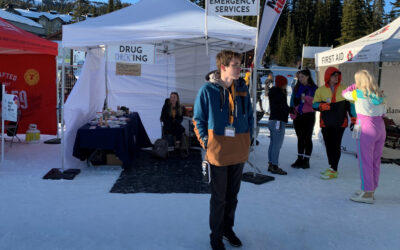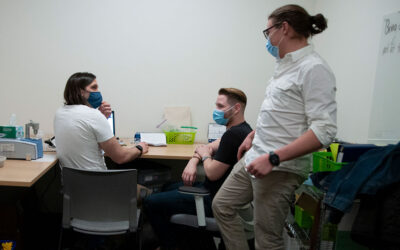HARM REDUCTION
HaRT partners with people who use drugs, health and social workers, and community members. We provide information and services about how to use substances in lower-risk ways. HaRT is an initiative of the Campus Wellness and Education Unit.
Reduce Harm
Learn how to reduce your risks when using substances. You can also learn how to reduce the risks for people around you who use substances. You can be trained in how to identify signs of a drug poisoning, how to use naloxone, and more!
Drug Checking
Find out what is in your drugs through our free and confidential drug checking. We can also provide information and resources for lower-risk drug use.
Support Recovery
We can recommend resources for students and community members who want to explore their relationship with substances.
Locations/Hours
Hours/Location
Tues – Fri 2 – 5 pm at 255 Lawrence Ave
Weds 5 – 7 pm at 1649 Pandosy Ave
What Is Harm Reduction?
Harm reduction has been practiced by people who use drugs for decades. Harm reduction is an evidence-based, person-centered approach that aims to reduce the harms of systems, policies, and substances. This approach focuses on the goals of the person; it does not require anyone to abstain from substance use. Rather, it supports using substances in a way that reduces the risk of harm.
What’s Our Goal?
Our goal is to eliminate the stigma associated with substance use, enhance accessibility to support and resources, and advocate for policies that prioritize a person’s well-being. We are committed to promoting equity, diversity, and inclusion in all our services, collaborative efforts, and activities. By working together and implementing these principles, we can create a brighter future for our community and individuals who use substances can do so without fear of harm or stigma.
Despite the challenges of toxic drugs spreading across Canada, we remain dedicated to creating a safe and inclusive community for all individuals. We believe in the importance of promoting harm reduction practices to reduce the harm caused by the ongoing crisis. That’s why we took action in 2020 and established our Harm Reduction Team (HaRT) to provide a wide range of harm reduction services, including drug checking, in the Okanagan.
Why Is the Toxic Drug Crisis a Serious Issue?
The majority of drug policies in Canada are based on neoliberal, racist beliefs (not public health). As a result, illegal drugs are made in unregulated ways. So, people who use drugs cannot be sure of what they are buying. It is also difficult to find quality information about how to use drugs. So, when someone wants to use a drug, they may not know how to use it in a way lower-risk way. Because of this history of harmful drug laws, there have been inequitable impacts for historically marginalized groups.
We compare the toxic drug crisis to alcohol. Imagine if you could not find information on how to consume alcohol, what healthy limits are, or how it is made. Also imagine that using alcohol is so stigmatized, you feel the need to use in private. And, image that alcohol is made by lots of different people in unregulated ways. This means that when you want a beer, you drink it alone, and sometimes there might be something you did not expect in it, like cough syrup. Since you are alone, if you have a bad reaction, nobody can help.
We believe that everyone has the right to use substances in lower-risk ways. That is why we provide drug-checking services, naloxone training, and other resources. We support people who use drugs.
Latest News
Decriminalization in British Columbia
What is decriminalization? Decriminalization represents a shift from a criminal justice response to one of a public health response to address substance use and the ongoing toxic drug epidemic. It is a form of harm reduction aimed at reducing the harm that arises...
UBCO Harm Reduction Team at Big White
Students working with the Campus Health Harm Reduction Team headed up to Big White Resort to provide drug testing at the AltiTunes Music Festival on Saturday, April 2nd. This was a first for the resort and for our team. Read more about it on INFOnews.ca. ...
Tackling Toxic Drugs at UBCO
UBCO’s collaboration with the community is breaking down barriers when it comes to accessing harm reduction services. Today the UBC Okanagan News featured an article about the HaRT (Harm Reduction Team) and the good things they are accomplishing on campus. HaRT’s work...
Deaths from toxic drugs in the past year
Number of lives lost since the declaration of the toxic drug crisis in April 2016
Drug toxicity is now the leading cause of death for young people in BC. We cannot simply hope that things will improve.
“Harm Reduction “shifts resources and power to the people who are most vulnerable to structural violence” (Monique Tula as quoted in Godfrey, 2018, p.x).””
– Monique Tula as quoted in Godfrey, 2018, p.x.

